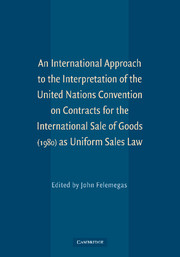Book contents
- Frontmatter
- Contents
- Foreword, by Eric E. Bergsten
- Contributors
- PART ONE INTRODUCTION
- PART TWO CISG–UNIDROIT Principles comparative editorials
- Art. 6 CISG–UP, by Bojidara Borisova [Bulgaria]
- Art. 7 CISG–UP, by Ulrich Magnus [Germany]
- Art. 8 CISG–UP, by Joseph M. Perillo [U.S.A.]
- Art. 9 CISG–UP, by Jorge Oviedo Alban [Colombia]
- Art. 10 CISG–UP, by Allison E. Butler [U.S.A.]
- Art. 11 CISG–UP, by Chantal Niggemann [Germany]
- Art. 13 CISG–UP, by Andrea Charters [U.S.A.]
- Art. 14 CISG–UP, by Jorge Oviedo Alban [Colombia]
- Art. 16 CISG–UP, by Andrea Vincze [Hungary]
- Art. 17 CISG–UP, by Stephen Smith [U.S.A.]
- Art. 18 CISG–UP, by Jorge Oviedo Alban [Colombia]
- Art. 20 CISG–UP, by John Felemegas [Australia]
- Art. 21 CISG–UP, by John Felemegas [Australia]
- Art. 22 CISG–UP, by John Felemegas [Australia]
- Art. 24 CISG–UP, by John Felemegas [Australia]
- Art. 25 CISG–UP, by Robert Koch [Germany]
- Arts. 26/39 CISG–UP–PECL, by Camilla Baasch Andersen [Denmark]
- Art. 27 CISG–UP–PECL, by Chengwei Liu [China]
- Arts. 28, 46, 62 CISG–UP, by John Felemegas [Australia]
- Art. 29 CISG–UP, by Sieg Eiselen [South Africa]
- Art. 35 CISG–UP–PECL, by René Franz Henschel [Denmark]
- Art. 37 CISG–UP, by Bertram Keller [Germany]
- Arts. 47/49 CISG–UP, by Robert Koch [Germany]
- Art. 48 CISG–UP, by Chris Kee [Australia]
- Art. 55 CISG–UP, by Jumpita Ruangvichatron [Thailand]
- Arts. 63/64 CISG–UP, by Robert Koch [Germany]
- Arts. 71/72 CISG–UP, by Sieg Eiselen [South Africa]
- Art. 74 CISG–UP, by Sieg Eiselen [South Africa]
- Art. 75 CISG–UP, by Bojidara Borisova [Bulgaria]
- Art. 76 CISG–UP, by Bruno Zeller [Australia]
- Art. 77 CISG–UP, by Elisabeth Opie [Australia]
- Art. 78 CISG–UP, by Sieg Eiselen [South Africa]
- Art. 79 CISG–UP, by Alejandro M. Garro [Argentina]
- Art. 80 CISG–UP, by Friederike Schäfer [Germany]
- Arts. 81/82 CISG–UP, by Florian Mohs [Switzerland]
- PART THREE CISG–PECL COMPARATIVE EDITORIALS
- Index
Art. 25 CISG–UP, by Robert Koch [Germany]
Published online by Cambridge University Press: 20 October 2009
- Frontmatter
- Contents
- Foreword, by Eric E. Bergsten
- Contributors
- PART ONE INTRODUCTION
- PART TWO CISG–UNIDROIT Principles comparative editorials
- Art. 6 CISG–UP, by Bojidara Borisova [Bulgaria]
- Art. 7 CISG–UP, by Ulrich Magnus [Germany]
- Art. 8 CISG–UP, by Joseph M. Perillo [U.S.A.]
- Art. 9 CISG–UP, by Jorge Oviedo Alban [Colombia]
- Art. 10 CISG–UP, by Allison E. Butler [U.S.A.]
- Art. 11 CISG–UP, by Chantal Niggemann [Germany]
- Art. 13 CISG–UP, by Andrea Charters [U.S.A.]
- Art. 14 CISG–UP, by Jorge Oviedo Alban [Colombia]
- Art. 16 CISG–UP, by Andrea Vincze [Hungary]
- Art. 17 CISG–UP, by Stephen Smith [U.S.A.]
- Art. 18 CISG–UP, by Jorge Oviedo Alban [Colombia]
- Art. 20 CISG–UP, by John Felemegas [Australia]
- Art. 21 CISG–UP, by John Felemegas [Australia]
- Art. 22 CISG–UP, by John Felemegas [Australia]
- Art. 24 CISG–UP, by John Felemegas [Australia]
- Art. 25 CISG–UP, by Robert Koch [Germany]
- Arts. 26/39 CISG–UP–PECL, by Camilla Baasch Andersen [Denmark]
- Art. 27 CISG–UP–PECL, by Chengwei Liu [China]
- Arts. 28, 46, 62 CISG–UP, by John Felemegas [Australia]
- Art. 29 CISG–UP, by Sieg Eiselen [South Africa]
- Art. 35 CISG–UP–PECL, by René Franz Henschel [Denmark]
- Art. 37 CISG–UP, by Bertram Keller [Germany]
- Arts. 47/49 CISG–UP, by Robert Koch [Germany]
- Art. 48 CISG–UP, by Chris Kee [Australia]
- Art. 55 CISG–UP, by Jumpita Ruangvichatron [Thailand]
- Arts. 63/64 CISG–UP, by Robert Koch [Germany]
- Arts. 71/72 CISG–UP, by Sieg Eiselen [South Africa]
- Art. 74 CISG–UP, by Sieg Eiselen [South Africa]
- Art. 75 CISG–UP, by Bojidara Borisova [Bulgaria]
- Art. 76 CISG–UP, by Bruno Zeller [Australia]
- Art. 77 CISG–UP, by Elisabeth Opie [Australia]
- Art. 78 CISG–UP, by Sieg Eiselen [South Africa]
- Art. 79 CISG–UP, by Alejandro M. Garro [Argentina]
- Art. 80 CISG–UP, by Friederike Schäfer [Germany]
- Arts. 81/82 CISG–UP, by Florian Mohs [Switzerland]
- PART THREE CISG–PECL COMPARATIVE EDITORIALS
- Index
Summary
INTRODUCTION
The concept of fundamental breach under Article 25 CISG plays a crucial role within the remedial system of the CISG because it determines the availability of the avoidance remedy in respect of any breach other than late performance (Articles 49(1)(a), 64(1)(a), 72(1), and 73(1) CISG) and of the substitute delivery remedy (Article 46(2) CISG). Fundamental breach is also important for the transfer of risk (Article 70 CISG). Its UNIDROIT Principles counterpart, fundamental non-performance, is defined in Article 7.3.1(2) of the UNIDROIT Principles. Unlike Article 25 CISG, its scope is limited to the termination of a contract. Before addressing the issue of whether or not Article 7.3.1(2) of the UNIDROIT Principles may be used to interpret or supplement Article 25 CISG, it is necessary to first take a closer look at the elements constituting fundamental breach, because recourse to the UNIDROIT Principles is only admissible where the language of the CISG provision gives rise to doubts as to the precise meaning of its content.
ELEMENTS CONSTITUTING FUNDAMENTAL BREACH
Article 25 provides that a breach is fundamental if
… it results in such detriment to the other party as substantially to deprive him of what he is entitled to expect under the contract, unless the party in breach did not foresee and a reasonable person of the same kind in the same circumstances would not have foreseen such result.
- Type
- Chapter
- Information
- Publisher: Cambridge University PressPrint publication year: 2007



